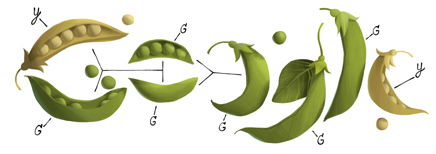
Born July 20, 1822, Gregor was an Austrian monk who studied everything from philosophy to physics. Today, he is commonly known as the "Father of Modern Genetics" because of his work in pea breeding. While living at St. Thomas Abbey, he conducted a study on plant variation and discovered the basic principles of inheritance. The Laws of Segregation and Independent Assortment are the base on which modern genetics is understood. These laws contradicted the theory of blending (mating a red flower with a white flower would always lead to pink) that were widely believed. What may come as a surprise is that Mendel's work did not immediately revolutionize genetics. It wasn't until the early 1900s when his theories were "rediscovered" and became the basis of modern genetics.
His work with recessive and dominant alleles is still used in its simplest form. Commonly we want to know what color calf our favorite Red and White Holstein cow if bred to a red carrier (has one Black and White and one Red and White allele) Holstein sire. Knowing that the Black and White allele is dominant in the breed, we know that there is a 50 percent chance of that calf being Red and White and 50 percent chance that the calf will display the dominant Black and White phenotype (animal's appearance) while still being a red carrier.
It is important to remember to look back at what discoveries make today's world possible. Everything from genomics to recessive genes to crossbreeding can be traced back to the work of Gregor Mendel and other genetic pioneers. Happy Birthday!








